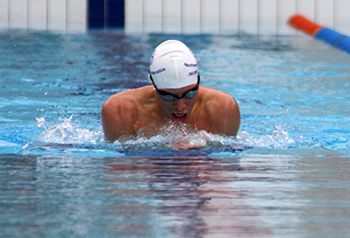
Johann van Heerden
Photo: Supplied |
Johann van Heerden will fly the Kovsie flag high in this year’s International Paralympic Committee (lPC) Swimming Championships in Glasgow. The University of the Free State first-year BEd student is one of 10 South Africans representing our country.
According to the South African Sports Confederation and Olympic Committee, 640 swimmers from about 50 countries are to plunge and stroke their way to the touch plates from 13-19 July.
“I first started swimming because I had a fit when I was born and it caused me to have Cerebral Palsy. My parents thought that, because my right-hand-side functioning was not good, swimming might help strengthen my muscles,” said Johann.
His parents played a major role in influencing the beginning of his professional swimming career.
Lauren van Heerden, Johann’s father, said, “I am so excited for him, and I am proud that he will be representing our country overseas. It is a big competition so it is a good experience for him.”
Qualifying for the IPC championships has proved that hard work pays off. As his coach, Mark Markgraaff, puts it: “Johann must go out there and have fun, most importantly; he will reap the benefits of his hard work.”
It is not only his parents and coach that Johann has made proud; Hetsie Veitch, Assistant Director of the Unit for Students with Disabilities, also expressed how proud she is.
“Since I’ve known him, he has been a very determined young man who is dedicated to his sport.”
The Rio Paralympics is where Johann envisions being next year.